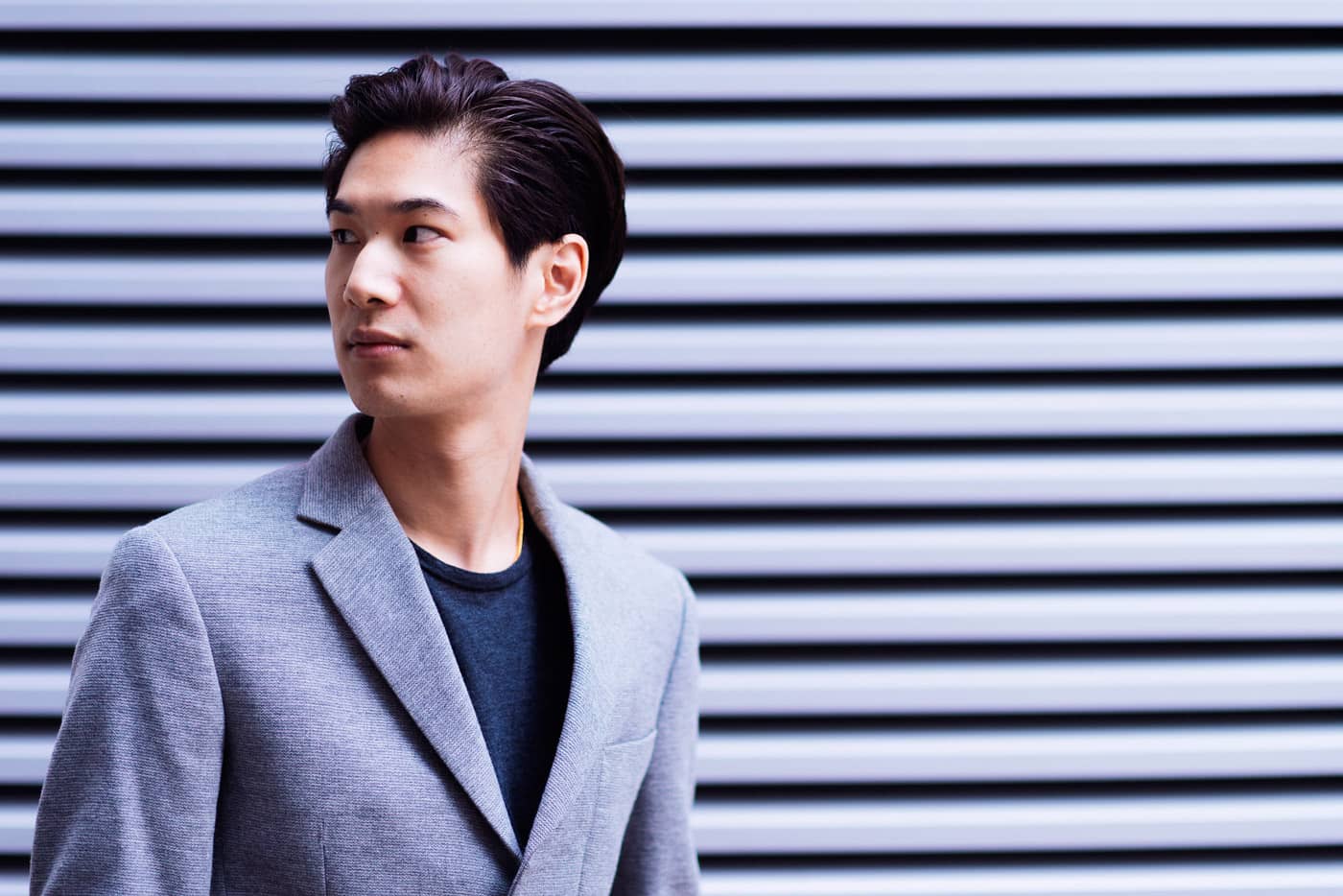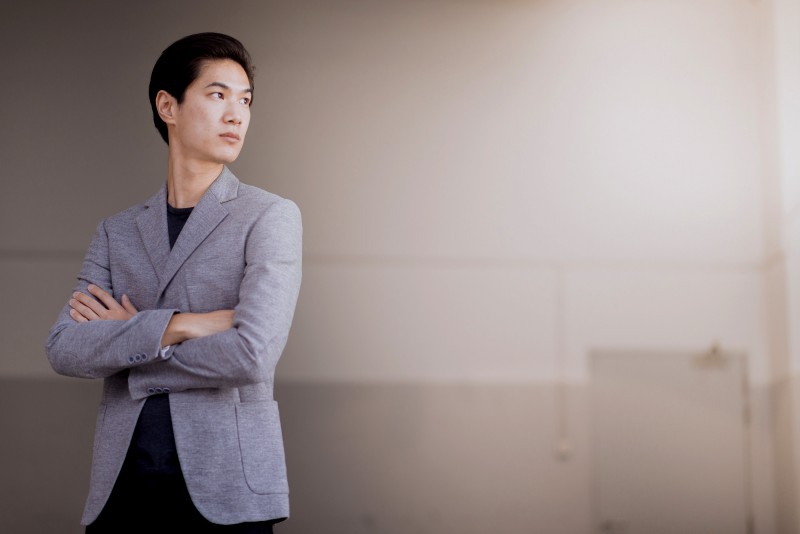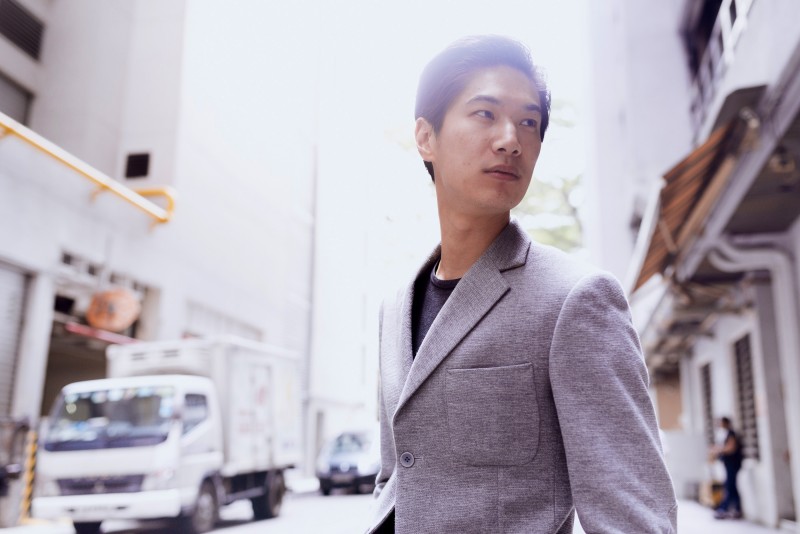Pei-Sian Ng: A League of His Own

Pei-Sian Ng’s German language teacher once mistook him for a different kind of musician. The kind who throws caution to the wind by binge drinking, abusing drugs and gallivanting around town with a muse-of-the-week wrapped around his shoulder—all this while, spotting an all-black ensemble of super skinny jeans and a form-fitting top with hair that can’t be tamed by hairspray alone. If you still have no inkling, google The Strokes, Matt Healy, or Alex Turner.
Yeah, a rock star. That’s actually the reason why his Instagram account is named "isteinrockstar". “My friends were making jokes about it and I thought it was pretty funny,” admits Pei-Sian, while he nurses his English breakfast tea. Physically, he looks the part but a more refined version: his statuesquely tall and lean 6-foot frame is even perfect for high fashion modelling. When I mention that he could easily walk the runways in Milan or Paris, he gives me a contemplative look—perhaps, my uncharacteristic comment seems to be a first.
At 30, Pei-Sian feels the best that he has ever been since he became the Principal Cellist of the Singapore Symphony Orchestra in 2010. This new wave of confidence has pushed him to the top of his game—garnering a stunning review from The Financial Times in his recent Kalevi Aho’s Concerto for Two Cellos performance (alongside his fraternal twin brother, Pei-Jee) on 16 January.
As I probe deeper on his fanbase or groupies, he tries to downplay it with a lightly worn urbanity. Most rock stars that I know of, don’t display such coy humility—he’s definitely in a league of his own.
WY-LENE YAP: How do I know that you are Pei-Sian and not Pei-Jee?
PEI-SIAN NG: My brother [Pei-Jee] has two dimples and I only have one. We have similar talents too. Strange, right?
WY-LENE: [laughs] I’m aware of that.
PEI-SIAN: Okay, he’s slightly taller than me by one or two centimetres.
WY-LENE: That’s hardly distinguishable.
PEI-SIAN: Have you seen pictures of us?
WY-LENE: Yes, of course. How about swapping identities?
PEI-SIAN: Nope. But we have shared the same identity before.
WY-LENE: So you really did not take any music exams on his behalf?
PEI-SIAN: No. [laughs] We are both quite independent, yet at the same time, competitive and strong—excelling in our own areas.
WY-LENE: Who is the better cellist?
PEI-SIAN: When you reach a certain level (professionally) and everyone is hitting the same note, it becomes very subjective. The difference lies in our personalities.
WY-LENE: What’s your personality like?
PEI-SIAN: Well, you can’t really pigeonhole it. I am so many things at different times.
WY-LENE: I get it—you’re an artiste.
PEI-SIAN: People say that I am more “sunny”. Pei-Jee is more serious and he’s so much cooler than me. Actually, I am a bit of a dork.
WY-LENE: You have such a unique accent. It sounds a bit British yet Australian at the same time.
PEI-SIAN: And slightly Asian too. I was in Manchester for 7 years. As musicians, we travel a lot, perform in different countries, attend masterclasses and go to festivals in Germany. We get to experience various cultures and meet people from all walks of life, so the accent comes from all the exposure that I had.
WY-LENE: Where are you from?
PEI-SIAN: I was born in Sydney.
WY-LENE: But you are based in Singapore?
PEI-SIAN: Yes. Singapore is my home because my work and life is here. Sometimes, I go back to Adelaide to see my family because I grew up there.
WY-LENE: When did you make it your home?
PEI-SIAN: In 2010, when I started my job as the Principal Cellist of the Singapore Symphony Orchestra. I also teach at the Yong Siew Toh Conservatory of Music. Time has flown by and I am 30 now – it’s amazing. I have never been happier.
WY-LENE: Was coming to Singapore, a defining moment in your life?
PEI-SIAN: Yeah. As twins, our careers have always been in tandem, until I went to Singapore to strike it out on my own. Being the younger twin (by a minute or so), I always felt that I was in the shadow of my brother (Pei-Jee). Growing up, there was a hierarchy and since I am the youngest, I was treated like a “baby”.
WY-LENE: It’s your moment to shine.
PEI-SIAN: This job is fantastic. If you think about the number of orchestras in the world, there is only one leading position for the cello. They are quite hard to come by and once someone gets that position, they can be there for years or even decades. Singapore is such a wonderful country and it has one of the most beautiful halls in the world. It’s a great package and I get to teach in the university too.
WY-LENE: How did you manage to get this coveted spot?
PEI-SIAN: I auditioned for it and I feel very lucky and grateful to get this position. Regardless of how well I played during my audition, there are other factors like experience and personal relationships – it all adds up.
WY-LENE: How is your relationship with the SSO like?
PEI-SIAN: I love my orchestra! We are like a family.
WY-LENE: Out of so many instruments, why the cello?
PEI-SIAN: My eldest brother was learning how to play the violin and my mum being a very practical woman, took us [Pei-Jee and I] to the same violin teacher. However, my eldest brother wasn’t the best student as he used to bring an empty violin case to class and because of that, the teacher turned us away. The second option was the cello and this amazing woman by the name of Barbara Yelland, ended up becoming my teacher. She had a great passion for the cello and under her guidance; I couldn’t help but fall in love with the instrument.
WY-LENE: What age was that?
PEI-SIAN: Five and a half.
WY-LENE: It seems like your parents always had the intention to develop your musical side.
PEI-SIAN: When my dad was younger, he used to play the violin in a youth orchestra. Since he enjoyed it, he thought that it would be good to learn an instrument but they never planned for us to become professionals. Being a twin and coming from a humble family, I shared everything with Pei-Jee. Everything. So having my own cello was extremely special and precious to me. Finally, I felt like my own person.
WY-LENE: How heavy is your cello?
PEI-SIAN: Nowadays, they make carbon fibre cases, so it’s pretty light. My cello (with the case) is only 7kg. Though I don’t normally walk around with it because of the size.
WY-LENE: Does your cello have a name?
PEI-SIAN: No. But it is definitely a female, since it is shaped like one. It is slightly smaller than a normal cello and there are a lot of curves: behind and in front! [laughs] It’s beautiful.
WY-LENE: Custom-made?
PEI-SIAN: It was made in 1764, in Bologna (North Italy). It’s a real antique and I have a 12-year relationship with it. I am so comfortable – to the point where it has become part of me.
WY-LENE: Wow, that’s long.
PEI-SIAN: It’s like a marriage. They say it takes 10 years to know an instrument and there is a lot of truth to that.
WY-LENE: How did your love for music start?
PEI-SIAN: Growing up, I had Classic FM on the radio. According to my mum, Classic FM was my babysitter and listening to classical music, made me happy. My mum would also buy tapes of all the great composers like Bach or Tchaikovsky. I think the Suzuki method helped too. One of my heroes is John Williams and his music from Star Wars inspired me. It was always a dream of mine to work in the London Symphony Orchestra and play music from the Star Wars soundtrack. Anyway, we [SSO] ended up doing that in Singapore. I think the future of classical music is actually in film. People don’t realise that they are listening to classical music when they are watching a film.
WY-LENE: Is life impossible without music?
PEI-SIAN: Life won’t be as beautiful—I don’t think that it is impossible. I wake up to Coldplay every day. Music has healing power and it can lift your spirits when you are really down. Sad music can heal you too.
WY-LENE: Won’t I get sadder?
PEI-SIAN: You can somehow enjoy the beauty of sadness.
WY-LENE: What kind of sound appeals to you the most?
PEI-SIAN: When I am playing the cello, I love the C string (the lowest string).
WY-LENE: Do you practise every day?
PEI-SIAN: I am on my cello every day. Sometimes, I am working or teaching. I can be on the cello for 8 hours and still feel like I am not practising. When you are a professional, practice is very hard to come by. I am lucky if I can get 1 or 2 hours a day. When you play by yourself, you can focus on your own sound and the quietness helps to heighten your senses.
WY-LENE: Let’s talk about your 5-star review in the Financial Times.
PEI-SIAN: I was extremely surprised. I never had a review in FT before. The programme was challenging and it was all modern music. The support and reaction was great. Don’t underestimate Singapore.
WY-LENE: It seems like you and Pei-Jee are a lethal combination. What’s the difference between performing solo and when both of you are together?
PEI-SIAN: It takes a lot of courage to perform on my own, as I am responsible for every single note. I do get nervous. When I am performing with my brother (Pei-Jee), I have more strength and energy so it’s less stressful – it’s nice to have that support. Pei-Jee is based in London and in the past; we used to work together regularly. It’s so fun to work with him and whenever we get a chance to do that, it becomes special to me.
WY-LENE: What goes through your mind when you are performing?
PEI-SIAN: Sometimes, I need to play from memory so I would have to close my eyes and dig into my brain. It could be half an hour of music, or more and I have to be in control. As a performer, being completely swept away in the music is not a good thing. Being in control is an art—every note that I play has to be intentional, not accidental.
WY-LENE: Favourite performance piece?
PEI-SIAN: Phoenix Story. I actually came up with that name. An Uzbek-Australian composer, Elena Kats-Chernin, specially wrote it for us [Pei-Jee and I].
WY-LENE: What’s next on your agenda?
PEI-SIAN: I have a concert in Philippines, Manila on 13 February. It is my first time with the Philippine Philharmonic Orchestra. In April, I will be doing a premiere of a piece by John Tavener at the Esplanade. I am looking forward to these two events!






